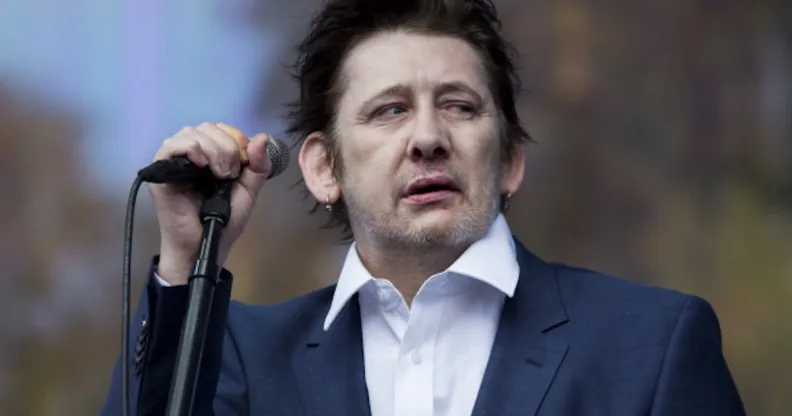The Pogues’ Shane MacGowan thinks it’s ‘ridiculous’ the BBC is censoring Fairytale of New York

Shane MacGowan of The Pogues. (Getty)
The Pogues lead singer Shane MacGowan has revealed what he thinks of the BBC’s plan to bleep out a homophobic slur from “Fairytale of New York”.
In what is essentially a Christmas tradition at this point, the beloved 1987 song has, since its release, ignited a debate over its tinderbox lyrics which include various slurs such as the word “faggot”.
The controversy was reignited even earlier this year after BBC bosses announced earlier this month that BBC Radio 1 will play an “alternative” version of the song that does not include the word.
In an interview with the Metro.co.uk, MacGowan, 62, was asked about his thoughts on the ban or a version of the song being played with “PC lyrics”.
“I think it’s ridiculous,” he said, noting that he is “a bit sick” of the song but does not “hate” it.
It comes after the band clashed with Laurence Fox over the censoring the slur.
Fox, an actor who has restyled himself as a right-wing commentator to become relevant again, took to Twitter to blast the BBC for blotting out the word.
“Here we go again,” Fox wrote. “The cultural commissars at the BBC are telling you what is and isn’t appropriate for your ignorant little ears.
“Wouldn’t it be nice if we sent the (proper) version to the top of the charts? #DefundTheBBC. RT.”
“F**k off you little herrenvolk s***e”, The Pogues, who along with the late Kirsty MacColl actually sang “Fairytale of New York”, gracefully hit back.
Shane MacGowan: ‘Faggot was used by the character because it fitted with the way she would speak’
This is not the first time MacGowan has defended the song’s gritty lyrics.
In 2018, in a statement released to Virgin Media Television’s The Tonight Show, the Irish-English vocalist sought to stress that the lyrics are not intended to offend.
“The word was used by the character because it fitted with the way she would speak and with her character,” he said.
“She is not supposed to be a nice person, or even a wholesome person. She is a woman of a certain generation at a certain time in history and she is down on her luck and desperate.
“Her dialogue is as accurate as I could make it but she is not intended to offend!”
He added: “If people don’t understand that I was trying to accurately portray the character as authentically as possible, then I am absolutely fine with them bleeping the word, but I don’t want to get into an argument.”

